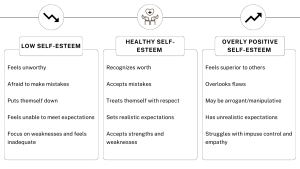Self-esteem
What is Self-esteem?
Self-esteem is how you feel about yourself. It means having a realistic idea of your characteristics and a positive view of who you are.1
Types of Self-esteem
Self-esteem may fall across a continuum including low self-esteem, healthy self-esteem, and overly positive self-esteem. See table below for characteristics associated with each type.2

To assess your level of self-esteem please visit: Rosenburg Self-Esteem Scale3
Why is Self-esteem Important?
Self-esteem is important because it affects every area of an individual’s life. It influences relationships, how someone completes day-to-day tasks, and can even have a major impact on an individual’s health. Research suggests that individual’s with low self-esteem have been shown to have an increased risk of depression, anxiety, PTSD, substance use, bipolar disorders, stress, and suicidal attempts.1, 4
Self-esteem Boosters vs. Busters
There are several factors that can positively or negatively influence an individual’s self-esteem, which can be referred to as self-esteem boosters or busters. Click on the chart below to learn more. 2, 5
Strategies for Boosting Self-esteem
Click on the icons below to learn more about strategies for boosting self-esteem.
Key Takeaways
- Survivors of domestic violence may experience a low self-esteem.
- Self-esteem influences relationships, how someone completes day-to-day tasks, and can even have a major impact on an individual’s health.
- Strategies for boosting self-esteem include engaging in self-care, exercising, doing an activity, and practicing mindfulness.
